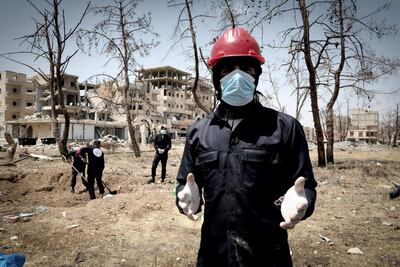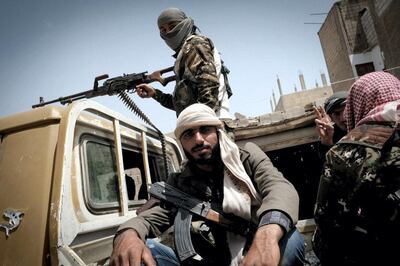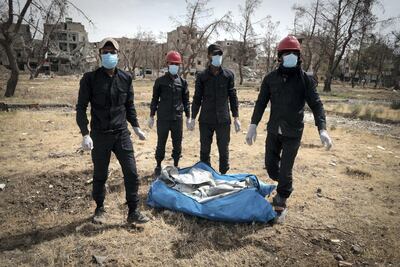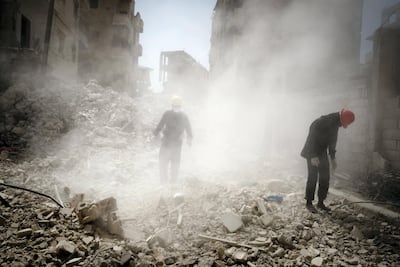There were small but ominous tell-tale signs. The driver suddenly turned off the medley of Kurdish music that had been blaring on a seemingly endless loop on our two-hour journey from the town of Ain Assa. In the back of the car, two Kurdish guards accompanying us cocked their Kalashnikov assault rifles.
As the heart of Raqqa loomed into view, its bomb-blasted ruins stood up like reefs beneath the surface of a lagoon. All around us towered multi-storey apartment blocks once filled with families. Prised apart by the terrifying force of explosions, the buildings' pillars, pipes, electrical cables and twisted ironwork spewed out like the innards of a disembowelled animal.
One could only imagine what it must have been like for civilians who lived here.
More than 400,000 people once inhabited Raqqa, before Syria's catastrophic civil war engulfed their lives. Since then, control of the city has changed hands three times. First, rebels seized it from the Syrian government and then it was taken from them by fighters from ISIS.
But between February and October last year the city and its citizens were subjected to their worst onslaught to date.
It was then that Raqqa was bludgeoned by a ferocious battle and siege as Kurdish-led Syrian Democratic Forces (SDF), backed by United States air and artillery strikes, struggled to oust ISIS from the self-proclaimed capital of their caliphate.

Today, the story goes that ISIS has gone. But they have not. And the hell of Raqqa remains.
"It's best that you leave the city and are back on the road to Ain Assa by mid-afternoon at the latest, certainly before dark," a young Kurdish officer called Farman says as we talk in the dilapidated stairwell of an apartment block in a city centre neighbourhood. The place stinks of raw sewerage and remains littered by spent cartridge cases.
"Daesh sleeper cells and supporters still cause problems, but we have them contained," Farman assures us, using the Arabic acronym by which ISIS is known.
______________
Read more:
The ‘crazy club’: Inside the British propaganda trips that seek to legitimise Assad's barbarism
Syria crisis drives rise in global internal displacement
ISIS' message thrives online after crushing defeat on the battlefield
______________
Incongruously for an otherwise hardened-looking fighter, Farman tenderly clutched a kitten that he and his comrades adopted and gave a home to in the ruined apartment block in which they are billeted.
Across Raqqa the SDF, comprising mainly Kurdish fighters of the People's Protection Units (YPG) along with Arab militias, patrol the city streets. There are those still fearful that ISIS could again become a presence to contend with.
The people running Raqqa's administration, a civil council aligned with the SDF, are centred in the town of Ain Assa from where we received our permits and security clearance before starting the first of our four-hour round trips to Raqqa.
In a city where telephone and mobile coverage is almost non-existent, communication between Raqqa and the outside world is done through these long road journeys, navigating endless checkpoints strung out along the cratered roads to other cities in northeastern Syria, such as Kobane and Qamishli.
"As you can see for yourself, the city is in need of everything - material support, help with clearing up the destruction and explosives, health services, the list is endless," says Abdullah Aryan, vice head of the Raqqa Civilian Council (RCC) at the local authority's headquarters.

Like many officials here, Aryan is worried about what comes next for Raqqa. To date there is precious little evidence of the international community's willingness to step up to the plate with support for the rebuilding of the city.
Brett McGuirk, the US special presidential envoy for the Global Coalition to Defeat ISIS, has frequently emphasised that Washington is only committed to the stabilisation of Raqqa, providing basic security and essential services, not to funding any long-term reconstruction. But on the ground in Raqqa there is little evidence of even this most basic pledge.
Nowhere is this more evident than in the efforts to clear the remaining corpses and human remains from the bombed ruins and mass graves.
Death is everywhere in Raqqa, its stench moving around the city, drifting on a humid breeze.
More than anyone else here, the men of Raqqa’s Civil Defence Unit know where death can be found. For going on six long months since the end of the siege they have sought out its many locations and collected its gruesome detritus along the way.
"We have already found about 70 corpses in this one spot," Dr Mahmood Ibraheem says, shouting to overpower the din from earthmoving equipment shovelling rubble into mounds which firemen from the unit scour by hand, wearing only thin surgical gloves, in search of body parts or corpses.
The resources the team have are shockingly basic and meagre. Such are the shortages they face that even the body bags they use are often recycled after emptying.
Despite this, the men work methodically. At times they appear to float as ghostly apparitions in the fog of white dust that hangs in the air clinging to their overalls and filling their noses and lungs.
___________
US office overseeing ISIS fight gets reprieve from Team Trump
___________
Doctors, let alone forensic pathologists, are also virtually non-existent in Raqqa these days and Dr Ibraheem, a GP, has found himself thrust into an unfamiliar and unforgiving role.
"I have to do this job now, there's no one else and we must at least record some of the details of those remains we find, even if we can't identify the victims," he says. "It is a human rights necessity as well as a medical one."
According to independent research groups that track American and Russian air strikes in Syria, US aircraft and artillery bombarded Raqqa with an estimated 20,000 munitions during a five-month operation. This is more than was dropped in Afghanistan in all of 2017.
The evidence of this devastating firepower and the way it struck the lives of those civilians who lived here is unavoidable in Raqqa’s canyons of ruins.
In the apartment block storeys above where the Civil Defence Unit worked that day, torn carpets and curtains hang like shrouds, while on those floors just visible lie schoolbooks, coat hangers and sandals, a child’s cot, toys and other personal belongings.
In one street, the unit arrived at a building where a handful of civilians returning to their homes reported an overpowering stench, suggesting corpses were nearby.
It was a tight narrow stairwell that led to the first floor where one of the families lived, some of whose members were waiting for the arrival of the team.
"Upstairs," said an elderly man, pointing to where the smell came from, his granddaughter standing alongside him holding a cloth over her nose and mouth and clearly terrified. Moving cautiously, the team almost instantly came across the remains of a body in a room, one wall of which had been blown out by an explosion.
I watched as one fireman tentatively probed at the bones, hair and decomposed heap on the floor with a stick before he and his colleague suddenly stepped back.
"Daesh," he said, the tone of his one word warning suggesting he had encountered something dangerous.
Moving tentatively, he stepped forward to tie some rope to what he warned was the remains of a suicide bomb belt. He then moved behind a nearby wall for cover and slowly pulled on the line to remove the belt, which on this occasion proved inert.
Downstairs, in the neighbourhood’s Rabiah al-Puqqii Street, bystanders looked on in horror covering their mouths and noses with sweaters and shirts against the smell as the remains of an ISIS fighter was loaded into an ambulance. Minutes later it was transferred into a nearby pick-up truck, bringing the day’s tally of body bags to a dozen.
__________
An eerie silence prevails in Assad's 'reconstructed' Homs
There's only one winner from missile strikes in Damascus
__________
Despite such gruesome findings, civilians, mostly with nowhere else to go, continue to live in Raqqa, and some have even returned from the city after fleeing to other areas and regions during the worst of the fighting.
In the city’s devastated Sakana district I visited the home of Khalil Al-Khalil. As ISIS overran the city, he along with other family members managed to escape Raqqa and leave Syria, to spend time in Casablanca in Morocco.
Today, Khalil and some family members are back in the city trying to pick up the pieces of their lives and repair what is left of the apartment that is still their home.
"Look around you," he says with a sweep of his arm, standing on the balcony of his third-floor flat looking out across the surrounding streets.
Everywhere, crumbling tower blocks stretch as far as the eye can see and the burned out carapaces of cars lie in the streets. Today, Raqqa is all but unrecognisable, even to those who know it well and who, like Khalil, have returned from across Syria and beyond to try to resurrect their lives and businesses.
"So far we have received no help from outside and the world seems to have forgotten us, but the people of Raqqa are rich in their character and we will rebuild the city that is our home, of that I'm certain," Khalil insists.
With an estimated 11,000 buildings in Raqqa destroyed or severely damaged, that task is gargantuan even as elsewhere the Syrian civil war continues its ruinous path, killing yet more people and uprooting others from their homes.

Currently the US-backed Kurdish authorities that control Raqqa are now focused on an escalating conflict with Turkey along Syria's northern border.
Just as many civilians were forced to flee Raqqa, many others have recently been uprooted from the city of Afrin after it was overrun by Turkish forces and their Syrian militia allies, the ranks of which are said by some observers to contain fighters not that far removed ideologically from ISIS.
"Our family's ancestors have been living in Afrin for over 200 years," says Nuri Urik, a 45-year-old Kurd who, along with his family and thousands of others, was recently forced from the city by the fighting.
Today, he and his wife, children and grandchildren have taken up home in the Kurdish controlled city of Kobane, another northeastern Syrian city which itself was subjected to massive destruction and siege during the resistance to ISIS four years ago.
Kobane, a hub of the Rojava Revolution, continues its own struggle to survive with very little help from the international community. For those, however, able to make it there from years of confinement in Raqqa, it is like another world. For many too who are escaping the fighting around Afrin, it has become a sanctuary of sorts.
"The whole journey was traumatic with the constant bombing, but the moment that we left Afrin was the worst, nobody remained in the village, everyone left," Nuri Urik recalled, of the day just a few months ago when he and his family fled.
During the journey, his daughter-in-law was pregnant. Once in Kobane, she gave birth to his granddaughter Xedice, who is now 1-week-old.
Nuri Urik says he has no idea when, or even if, the family will ever be able to return to Afrin, and for now like so many ordinary Syrians they remain uprooted.
Raqqa, Kobane and now Afrin, three Syrian cities that have paid a heavy price in this seemingly interminable conflict. For the citizens of all three communities the future remains more unpredictable than ever.









